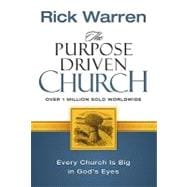
Note: Supplemental materials are not guaranteed with Rental or Used book purchases.
Purchase Benefits
Looking to rent a book? Rent Purpose-Driven Church : Growth Without Compromising Your Message and Mission [ISBN: 9780310201069] for the semester, quarter, and short term or search our site for other textbooks by Rick Warren. Renting a textbook can save you up to 90% from the cost of buying.
| Contents | |
| Foreword by Dr. W. A. Criswell | |
| Surfing Spiritual Waves | |
| Part One • Seeing the Big Picture | |
| 1. The Saddleback Story | |
| 2. Myths About Growing Churches | |
| Part Two • Becoming a Purpose-Driven Church | |
| 3. What Drives Your Church? | |
| 4. The Foundation for a Healthy Church | |
| 5. Defining Your Purposes | |
| 6. Communicating Your Purposes | |
| 7. Organizing Around Your Purposes | |
| 8. Applying Your Purposes | |
| Part Three • Reaching Out to Your Community | |
| 9. Who Is Your Target? | |
| 10. Knowing Whom You Can Best Reach | |
| 11. Developing Your Strategy | |
| Part Four • Bringing In a Crowd | |
| 12. How Jesus Attracted Crowds | |
| 13. Worship Can Be a Witness | |
| 14. Designing a Seeker-Sensitive Service | |
| 15. Selecting Your Music | |
| 16. Preaching to the Unchurched | |
| Part Five • Building Up the Church | |
| 17. Turning Attenders into Members (Congregation) | |
| 18. Developing Mature Members (Committed) | |
| 19. Turning Members into Ministers (Core) |
The New copy of this book will include any supplemental materials advertised. Please check the title of the book to determine if it should include any access cards, study guides, lab manuals, CDs, etc.
The Used, Rental and eBook copies of this book are not guaranteed to include any supplemental materials. Typically, only the book itself is included. This is true even if the title states it includes any access cards, study guides, lab manuals, CDs, etc.
Excerpted from Purpose Driven Church: Growth Without Compromising Your Message and Mission by Rick Warren
All rights reserved by the original copyright owners. Excerpts are provided for display purposes only and may not be reproduced, reprinted or distributed without the written permission of the publisher.